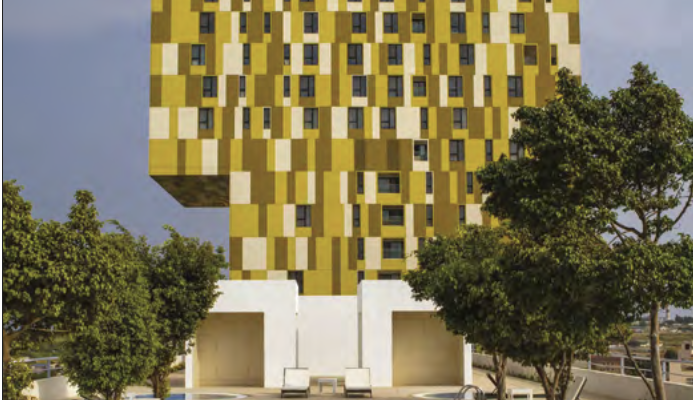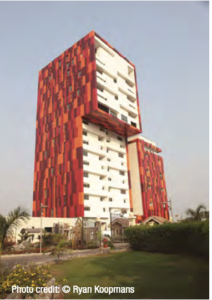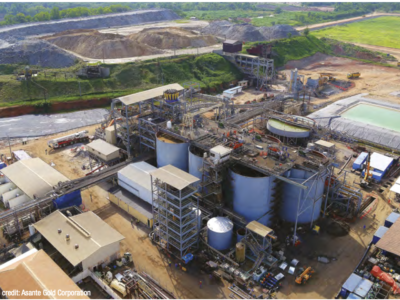Ghana ‘s real-estate sector has emerged as a
powerhouse of economic growth, notably growing at
a remarkable compound annual growth rate (CAGR) of 30 percent between 2016 and 2021. This impressive growth trajectory solidifies its position as one of the primary engines driving the country’s economic expansion. There are four main segments in the sector. The office market caters
to the needs of businesses and corporations for workspace; the retail market provides venues for commercial activities and consumer engagement; the industrial market facilitates production and logistics operations; and the residential market meets the housing needs of individuals and families across various income brackets.
The office real-estate market in Ghana is primarily driven by private sector enti- ties, which have established state-of-the- art facilities tailored to meet the diverse needs of companies seeking modern workspaces. Currently, the market boasts a substantial stock of A-grade developments, totalling approximately 144,105 square metres, with an addi- tional 15,000 square metres in pipeline developments. This robust infrastruc- ture foundation underscores the sector’s commitment to providing high-quality office spaces that cater to the evolving demands of businesses.
The pre-pandemic period witnessed significant advancements in the office real-estate market, fuelled in part by government initiatives aimed at indus- trial transformation and the provision of tax incentives. These initiatives ef- fectively created an attractive business environment, drawing both indigenous companies and multinational corpora- tions to invest in office spaces. The surge in demand for office spaces during this period reflects the confidence of busi- nesses in Ghana’s economic prospects and growth potential.
Accra remains the focal point of office space demand, with key locations such as Ridge, Airport City, and Canton- ments emerging as preferred destina- tions for businesses seeking prime office locations. These areas offer strategic ad- vantages, including proximity to com- mercial hubs, transportation networks, and essential amenities, further enhanc- ing their appeal to tenants in the office real-estate market.
The residential real-estate sector in Gha- na encompasses structures designed for dwelling, living, or sleeping, catering to individuals, households, or groups of people. Over the years, both govern- ment and private sector entities have played pivotal roles in the development of residential structures, contributing to a notable increase in the total number of residential units..
Ghana still faces a substantial housing deficit, estimated at 1.8 million units.
Approximately 60 percent of the urban population requires government assis- tance to access decent housing facilities, highlighting the pressing need for af- fordable housing solutions. In response, the Ministry of Works and Housing has initiated various programmes aimed at providing affordable housing units and creating an enabling environment for private sector involvement.
To address the housing deficit, several financial institutions, including nine of the 23 universal banks in Ghana, offer mortgage products tailored to various housing needs, from home purchases to renovations. Additionally, the National Homeownership Fund collaborates with banks and real-estate investment trusts to implement schemes like Rent to Own, aimed at bridging the housing gap.
On the supply side, the government is actively involved in facilitating land provision to developers, infrastructure development at designated affordable housing project sites, and offering tax incentives and exemptions to encourage investment in the residential real-estate sector. Moreover, collaborative efforts between the Ministry of Works and Housing and the State Housing Corpo- ration have led to the commencement of construction projects, including the development of 6,584 rental hous- ing units at the district level for public workers.
Some of the prominent retail brands in Ghana include Shoprite, Max Mart, Koala, and Melcom, which operate primarily from privately owned malls on a tenancy basis, collectively occu- pying an estimated stock size of about 138,000 square metres. While shopping malls remain popular destinations for retailers, recent trends indicate a diver- sification in retail locations, with some retailers opting for converted residen- tial developments and others operating from medium-sized retail plazas.
Accra Mall, one of the prominent retail destinations in Ghana, attracts approxi- mately 7 million customers annually and currently maintains a vacancy rate of 5 percent among the listed malls. Looking ahead, there are pipeline in- vestments in the retail real-estate space, including projects such as the Garden City Mall in Kumasi and World Mall Ghana, located off the Spintex Road in Accra. These developments signify con- tinued growth and investment opportu- nities in Ghana’s retail sector.
Ghana’s industrial hubs, primarily lo- cated in Accra, Tema, Kumasi, and Takoradi, play a crucial role in driving economic growth. While the cocoa and energy industries have historically dominated the industrial market, vari- ous government initiatives are poised to stimulate significant growth in this sector.
One such initiative is the One District One Warehouse programme led by the Ministry of Agriculture and Ministry of Special Initiative. This initiative aims to increase the number of warehouses across the country, enhancing storage capacity and logistical capabilities. Additionally, the establishment of Spe- cialised Industrial Zones, as part of the Ministry of Trade and Industry’s indus- trialisation plan, is expected to expand Ghana’s industrial real-estate footprint. Collaborating with the private sector, initiatives like the Dawa Industrial Park and the Tema Industrial Park by LMI Holdings have already been completed, providing modern facilities for indus- trial activities.
The decision to host the AfCFTA sec- retariat in Ghana, along with associated incentives such as tariff-free access for Ghanaian manufacturers to 53 other economies, is anticipated to bolster industrial production. This increased production will drive demand for ware- house space as factories ramp up op- erations to meet domestic and regional market demands.
SECTOR OPPORTUNITIES
• Investment in land in areas such as Kasoa, Gbawe, Aburi, Peduase, and their surroundings offers substantial potential for significant future value ap- preciation in Ghana’s real-estate sector. • Constructing single-family houses ranging from two to five bedrooms to reduce the housing deficit of approxi- mately 1.8 million houses and match the projected growth in the percentage of middle-class households.
• Investing in luxurious residential apartments in prime areas like Cantonments, East Legon, and Roman Ridge to cater to the growing demand from expatriates relocating to Ghana for business purposes, providing them with state-of-the-art facilities and amenities.
• Investing in smaller apartment buildings situated near or on the cam- puses of tertiary educational institu- tions to help address the shortage of residential facilities on some university campuses in the country, catering to the accommodation needs of students and faculty members.
• Developing retail facilities in prime locations such as Accra, Madina, and Kumasi offers lucrative investment op- portunities due to their high levels of retail activity and the growing demand for retail space in these areas.
• Implementing the One District One Factory (1D1F) initiative presents a lu- crative opportunity for warehousing, especially as factories increase their pro- duction of manufactured goods for both local distribution and export.
INVESTMENT INCENTIVES
• Ghana provides tax incentives to real-estate companies to carry forward losses incurred in the first three years of operation.
• Investors in real-estate are allowed free transferability of capital, profits and dividends.
• Ghana is a signatory to the World Bank’s Multilateral Investment Guar- antee Agency (MIGA) Convention and has Double Taxation Agreements (DTAs) to rationalise tax obligations of investors in order to prevent double taxation.

















Comments